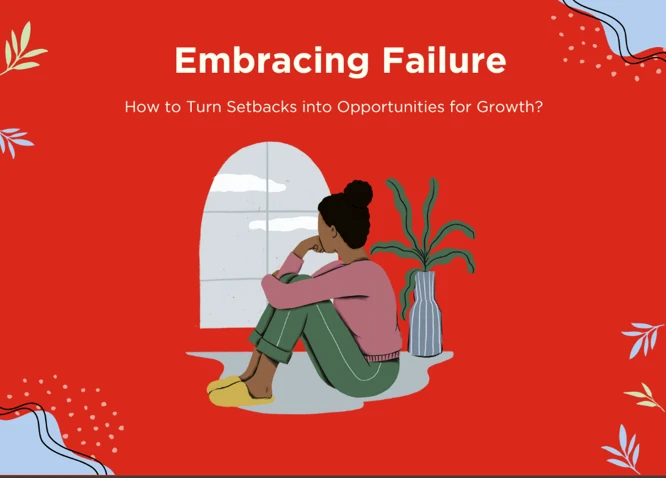Why is failure often viewed as something to be avoided or ashamed of? In reality, failure is an essential part of the learning process. It provides valuable lessons that can shape our personal and professional growth. By embracing failure and adopting a mindset focused on learning and growth, we can unlock our true potential and overcome any setback. In this article, we will explore the importance of failure, the lessons it can teach us, and strategies for embracing failure to turn setbacks into opportunities. So let’s challenge our preconceived notions and dive into the world of embracing failure!
The Importance of Failure

Failure is not something to be feared or avoided; instead, it is a valuable teacher and a necessary part of growth. When we experience failure, we are presented with an opportunity to learn and improve ourselves. It is through failure that we are able to gain a deeper understanding of our strengths, weaknesses, and areas for improvement. Failure pushes us out of our comfort zones and forces us to reevaluate our approach to achieving success. By embracing failure, we can develop resilience and perseverance, qualities that are crucial for overcoming obstacles and achieving our goals. When we fail, we are also able to learn important life lessons that can shape our future decisions and actions. Failure teaches us humility, patience, and the importance of adaptability. It reminds us that success is not always linear, and that setbacks are inevitable on the path to success. So, rather than viewing failure as a negative outcome, we should see it as a stepping stone towards personal and professional growth. By understanding the importance of failure and viewing it as a valuable opportunity for learning, we can navigate challenges with a positive mindset and ultimately achieve greater success in our endeavors.
Recognizing Failure as an Opportunity
Recognizing failure as an opportunity is a mindset shift that allows us to view setbacks in a new light. Instead of dwelling on the negative aspects of failure, we can reframe our perspective and see the potential for growth and learning. By acknowledging failure as an opportunity, we can open ourselves up to new possibilities and insights. One way to recognize failure as an opportunity is by reflecting on the lessons learned from the experience. Taking the time to analyze what went wrong, what could have been done differently, and what skills or knowledge gaps were exposed can provide valuable insights for future endeavors. Embracing failure as an opportunity also involves embracing the discomfort and challenges that come with it. It requires us to step outside of our comfort zones and take calculated risks. It is in these moments of failure that we have the opportunity to test our resilience and inner strength. It’s important to understand that failure should not be seen as a reflection of our self-worth or abilities, but rather as a chance to learn, adapt, and grow. By recognizing failure as an opportunity, we can cultivate a growth mindset, constantly seeking improvement and embracing the lessons that failure presents to us. In doing so, we can ultimately turn setbacks into stepping stones towards success.
Changing Perspectives on Failure
Changing our perspectives on failure is essential for personal and professional growth. Instead of viewing failure as a negative outcome or a reflection of our abilities, we should see it as a natural part of the learning process. Failure provides us with valuable feedback and insights, highlighting areas where we can improve and grow. By shifting our mindset, we can reframe failure as a stepping stone towards success rather than a roadblock. When we change our perspective on failure, we can become more resilient and better equipped to handle setbacks. We can understand that failure is not a reflection of our worth or potential, but rather an opportunity to learn and become better. By embracing failure and adopting a growth mindset, we can overcome self-doubt and fear, allowing us to take more risks and pursue our dreams. So, let’s challenge our beliefs about failure and recognize it as a necessary and valuable part of our journey towards achieving our goals.
Lessons Learned from Failure

Failure offers numerous valuable lessons that can shape our personal and professional development. Here are some key lessons we can learn from failure:
1. Building Resilience: Failure challenges us to bounce back from setbacks and develop resilience. It teaches us to persevere in the face of adversity and to stay motivated towards achieving our dreams. By learning to pick ourselves up after a failure, we become better equipped to handle future challenges and setbacks.
2. Developing Problem-Solving Skills: Failure often presents us with problems or obstacles that we must overcome. It pushes us to think creatively and find innovative solutions. Each failure provides an opportunity to develop our problem-solving skills and uncover new approaches to overcoming obstacles.
3. Cultivating a Growth Mindset: Failure helps us develop a growth mindset, which is the belief that our abilities and intelligence can be developed through dedication and hard work. When we experience failure, we can choose to view it as a temporary setback and an opportunity for growth. By embracing a growth mindset, we become more inclined to learn from our mistakes and persist in the face of challenges.
By reflecting on these lessons and actively applying them in our lives, we can transform failure into a catalyst for personal and professional growth. We must remember that failure is not an endpoint but rather a stepping stone towards success. So, let’s continue to learn from our failures and use them as stepping stones on our journey towards achieving our dreams. (For additional motivation and strategies for turning dreams into reality, you can check out this article.)
Building Resilience
Building resilience is one of the key lessons we can learn from failure. Resilience is the ability to bounce back from setbacks and adversity and to keep moving forward. When we face failure, it can be disheartening and demoralizing. However, by developing resilience, we can better navigate through these difficult times. Resilient individuals are able to adapt to change, persevere through challenges, and maintain a positive mindset. One way to build resilience is by reframing failures as learning experiences rather than dwelling on the negative aspects. It’s important to remember that failure is not a reflection of our worth or abilities but rather an opportunity for growth. Additionally, seeking support from others, whether it be friends, family, or mentors, can provide valuable perspectives and encouragement during times of failure. By developing resilience, we can become more equipped to handle setbacks and build the resilience needed to continue pursuing our dreams and goals. It’s through failures and the subsequent resilience that we foster a mindset of growth and strive for continued success.
Developing Problem-Solving Skills
Developing problem-solving skills is a crucial outcome of embracing failure. When we encounter setbacks, we are forced to find solutions to overcome the challenges we face. Failure pushes us to think creatively and outside the box, encouraging us to explore alternative approaches and strategies. By analyzing the reasons behind our failures, we can identify the root causes and develop effective problem-solving techniques. Each failure provides a unique learning experience, allowing us to refine our problem-solving skills and build a repertoire of strategies to tackle future challenges. Through trial and error, we become more adept at identifying patterns, understanding complex issues, and finding innovative solutions. Problem-solving skills are transferable to various aspects of life, both personally and professionally. They enable us to overcome obstacles, make informed decisions, and adapt to changing circumstances. So, by embracing failure and viewing it as an opportunity to develop problem-solving skills, we can enhance our ability to navigate challenges and achieve success in our endeavors. If you want to learn more about staying motivated while achieving your dreams, check out our article on staying motivated to achieve your dreams.
Cultivating a Growth Mindset
Cultivating a growth mindset is crucial for embracing failure and turning setbacks into opportunities for growth. A growth mindset is the belief that our abilities and intelligence are not fixed, but can be developed through effort, learning, and perseverance. When we adopt a growth mindset, we see failure not as a reflection of our worth or intelligence, but as a chance to learn and improve. Instead of giving up when faced with a setback, we view it as a stepping stone towards success. Developing a growth mindset involves reframing our thoughts and beliefs about failure. Rather than seeing failure as a final outcome, we see it as a temporary setback that can provide valuable feedback and insights. We focus on the process of learning and improvement, rather than just the end result. Additionally, cultivating a growth mindset involves embracing challenges and seeking opportunities to expand our skills and knowledge. This may involve stepping out of our comfort zones, taking on new tasks, or seeking feedback and advice from others. By adopting a growth mindset, we not only become more resilient in the face of failure, but we also open ourselves up to new possibilities and continuous growth. So, let’s cultivate a growth mindset and harness the power of failure to propel ourselves towards success.
Strategies for Embracing Failure

When it comes to embracing failure, there are several strategies that can assist us in navigating setbacks and using them as opportunities for growth.
1. Setting Realistic Expectations: One of the key strategies is to set realistic expectations for ourselves. Unrealistic expectations can lead to disappointment and a fear of failure. By setting achievable goals, we allow ourselves room to learn and grow without being weighed down by the pressure of unrealistic outcomes.
2. Seeking Feedback and Learning from Mistakes: Feedback is a valuable tool for growth. By actively seeking feedback from mentors, peers, or experts in our respective fields, we can gain insights into areas for improvement. Learning from our mistakes and actively applying the feedback received allows us to course-correct and grow in our endeavors.
3. Challenging Comfort Zones: Embracing failure often means stepping out of our comfort zones and taking calculated risks. Pushing ourselves to try new things and explore unfamiliar territory can lead to valuable experiences and personal growth. It allows us to expand our skillset and develop resilience in the face of challenges.
By incorporating these strategies into our mindset and daily practice, we can cultivate a positive approach to failure. It is important to remember that failure is not an endpoint but rather a stepping stone towards success. It is through these setbacks that we can learn, adapt, and ultimately achieve our goals. So, let’s embrace failure as an opportunity for growth and keep moving forward on our journey towards success.
Setting Realistic Expectations
Setting realistic expectations is a crucial step in embracing failure and learning from setbacks. Often, we set lofty goals and expect immediate success, which can lead to disappointment and discouragement when things don’t go as planned. By setting realistic expectations, we create a more accurate and achievable vision of what we want to accomplish. It is important to assess our abilities, resources, and the time required to reach our goals. This allows us to break down our objectives into smaller, manageable tasks, making them less overwhelming. When our expectations are grounded in reality, we are better equipped to handle setbacks and challenges along the way.
One strategy for setting realistic expectations is to create a timeline or action plan. This plan can outline the steps required to achieve our goals, providing a clear roadmap for success. By setting specific milestones and deadlines, we can better gauge our progress and adjust our expectations accordingly. It’s important to remember that success is rarely a straight path, and setbacks and delays are to be expected. By incorporating flexibility into our expectations, we allow room for adaptation and learning from failures.
It can be helpful to seek guidance from mentors or experts in our field. Their insights and experiences can provide valuable perspectives on what is realistic and achievable. This can prevent us from setting expectations that are too high or unrealistic given our current circumstances.
By setting realistic expectations, we align ourselves with the reality of our capabilities and the obstacles we may encounter. This allows us to approach our goals with a more balanced mindset, reducing the fear of failure and increasing our chances of success. So, let’s take the time to set realistic expectations and create a solid foundation for learning and growing from setbacks.
Seeking Feedback and Learning from Mistakes
One effective strategy for embracing failure is to actively seek feedback and learn from our mistakes. When we face setbacks or failures, it can be easy to get discouraged and overlook the lessons that can be gleaned from these experiences. However, by seeking feedback from others, we can gain valuable insights and different perspectives that can help us grow and improve. Feedback gives us a chance to understand what went wrong and provides guidance on how to make adjustments for future success.
There are several ways to seek feedback and learn from mistakes. One approach is to reach out to trusted mentors, colleagues, or even friends who can provide objective insights and constructive criticism. By soliciting input from others, we gain fresh perspectives, identify blind spots, and pinpoint areas where we can enhance our skills or approaches. Additionally, seeking feedback allows us to strengthen our self-awareness and better understand our own strengths and weaknesses.
Another valuable way to learn from mistakes is through self-reflection. Taking the time to pause and analyze our failures allows us to identify patterns or behaviors that may have contributed to the outcome. By honestly assessing our actions and decisions, we can learn important lessons and make necessary improvements. Self-reflection can be facilitated through journaling, meditation, or even discussing our experiences with a trusted confidant.
It is important to remember that seeking feedback and learning from mistakes requires humility and openness. We must be willing to accept and digest feedback, even if it may be initially difficult to hear. It is natural to feel defensive or resistant to critique, but by embracing a growth mindset, we can view feedback as an opportunity for improvement rather than a personal attack.
By actively seeking feedback and learning from our mistakes, we can turn failures into valuable learning experiences. This process not only helps us grow and develop personally, but it also allows us to become more resilient in the face of future challenges. So, let us open ourselves up to feedback and use it as a tool for continuous improvement and success in our endeavors.
Challenging Comfort Zones
Challenging comfort zones is an essential component of embracing failure and fostering personal growth. Comfort zones refer to the familiar routines and environments where we feel safe and comfortable. While staying within our comfort zones may provide temporary security, it hinders our ability to learn and grow. By stepping outside of these zones, we expose ourselves to new experiences and opportunities for self-improvement. Pushing the boundaries of our comfort zones allows us to develop new skills, gain confidence, and broaden our perspectives. Whether it’s taking on a new project at work, trying a new hobby, or overcoming a fear, stepping outside of our comfort zones can lead to significant personal growth. It may feel uncomfortable and even intimidating at first, but embracing the unknown is where true growth lies. Challenging comfort zones also plays a crucial role in overcoming the fear of failure itself. By embracing failure and taking risks, we become more resilient and adaptable, which can ultimately lead to greater success. So, let us be willing to step outside of our comfort zones, take on new challenges, and embrace the unknown. By doing so, we open ourselves up to a world of possibilities and personal growth.
Turning Setbacks into Opportunities

Turning setbacks into opportunities requires a shift in perspective and a willingness to embrace challenges. When faced with a setback, it can be easy to become discouraged or give up on our goals. However, by reframing failures as learning experiences, we can find the silver linings and transform setbacks into opportunities for growth. One way to do this is by analyzing the reasons behind the setback and identifying key lessons that can be learned from it. This introspection allows us to gain valuable insights into our own strengths and weaknesses, enabling us to make necessary adjustments and improvements moving forward. Additionally, setbacks can serve as opportunities to innovate and think outside the box. When our initial strategies fail, we are forced to explore alternative approaches and solutions. This can lead to the discovery of new ideas and paths that we may not have considered otherwise. By viewing setbacks as opportunities rather than roadblocks, we open ourselves up to new possibilities and increase our chances of success. Remember, success is not defined by the absence of failure, but rather by how we respond to it. So, embrace setbacks as stepping stones on your journey, learn from them, and use them as springboards to propel yourself closer to your goals and aspirations. To complement this process, utilizing visualization techniques can be a powerful tool. Visualization exercises help us mentally rehearse success, boosting our confidence and motivation. By visualizing ourselves overcoming setbacks and achieving our goals, we can maintain a positive mindset and stay motivated throughout the process. [Link text: Learn more about the power of visualization in achieving dreams](/visualization-power-achieving-dreams/).
Reframing Failures as Learning Experiences
When faced with failure, it is essential to reframe our perspective and view these setbacks as valuable learning experiences. Instead of dwelling on the negative aspects of failure, we should focus on what we can gain from it. Every failure presents an opportunity for growth and self-reflection. By reframing failures as learning experiences, we can extract valuable insights and knowledge that can be applied to future endeavors. This involves analyzing the reasons behind our failure, identifying any patterns or recurring mistakes, and seeking to understand what we can do differently next time. Through this process, we gain a deeper understanding of our strengths and weaknesses, allowing us to make better-informed decisions moving forward. By embracing failure as a valuable part of our journey, we open ourselves up to continuous improvement and personal growth. Remember, failure does not define us; rather, it is an opportunity to learn and come back stronger than before. So, let’s reframe our perception of failure and embrace it as an invaluable teacher on our path to success.
Finding Silver Linings
Finding silver linings in the face of failure can be a powerful tool for personal and professional growth. It involves reframing our perspective on setbacks and looking for the positives that can arise from seemingly negative experiences. One way to find silver linings is by focusing on the lessons learned from failure. Each setback provides an opportunity to gain new knowledge, skills, or insights that can be applied in future endeavors. Additionally, failure can serve as a catalyst for innovation and creativity. It forces us to think outside the box, explore alternative solutions, and adapt our strategies. Another approach is to seek support and guidance from others, turning failure into an opportunity for connection and collaboration. By discussing our experiences with trusted individuals, we can gain different perspectives, receive valuable feedback, and generate new ideas. Additionally, finding silver linings involves practicing gratitude. It means acknowledging the small victories, the progress made, and the strengths that have been uncovered or developed throughout the journey. This mindset shift allows us to maintain a positive outlook and prevent failure from demotivating or discouraging us. So in times of failure, instead of dwelling on the negatives, let’s choose to find the silver linings that can lead us towards future success.
The Benefits of Embracing Failure
Embracing failure comes with a multitude of benefits that can positively impact both our personal and professional lives. Firstly, embracing failure fosters personal growth and development. When we embrace failure, we open ourselves up to new experiences and opportunities for learning. We gain a deeper understanding of our strengths and weaknesses, allowing us to make more informed decisions and take calculated risks in the future. Failure teaches us resilience. By overcoming setbacks and bouncing back from failure, we develop the ability to persevere through challenges and obstacles. This resilience not only helps us cope with future failures but also builds our confidence in our ability to handle adversity. Additionally, embracing failure cultivates a growth mindset. Instead of viewing failure as a reflection of our abilities, we see it as a chance to learn and improve. This mindset shift allows us to approach challenges with optimism and a sense of possibility, leading to increased creativity and problem-solving skills. Embracing failure leads to personal growth, increased resilience, and a mindset focused on continuous improvement and learning. Through failures, we find greater success in all aspects of our lives.
Personal Growth and Development
Personal growth and development are significant benefits of embracing failure. When we encounter setbacks and failures, we are presented with an opportunity for self-reflection and introspection. We have the chance to evaluate our actions, beliefs, and behaviors, and identify areas where we can improve. This process of self-reflection helps us gain a better understanding of ourselves, our values, and our goals. It enables us to identify our strengths and weaknesses, and take steps towards personal growth.
Failure also provides a unique learning experience that cannot be obtained through successes alone. It forces us to step outside our comfort zones and confront our limitations. Through this process, we learn important life lessons, gain valuable insights, and acquire new skills.
One way to foster personal growth and development through failure is by adopting a growth mindset. This mindset embraces the idea that failures and setbacks are opportunities for learning and growth. It encourages us to view challenges as stepping stones towards reaching our potential. By cultivating a growth mindset, we can approach failure with resilience, determination, and a willingness to learn from our mistakes.
Another way to promote personal growth through failure is by seeking feedback and learning from our mistakes. When we encounter failures, it can be helpful to ask for input from others who have experience or expertise in the area. Their feedback can provide valuable insights and different perspectives, helping us gain clarity on areas for improvement.
Additionally, challenging our comfort zones is crucial for personal growth. By taking risks and stepping into unfamiliar territory, we expand our horizons and develop new skills and abilities. Embracing failure allows us to embrace the unknown and push our limits, leading to personal growth and development.
Embracing failure is a catalyst for personal growth and development. It provides us with opportunities for self-reflection, learning, and acquiring new skills. By adopting a growth mindset, seeking feedback, and challenging our comfort zones, we can embrace failure as a powerful tool for personal growth and set ourselves up for long-term success.
Increased Resilience
Increased resilience is one of the key benefits of embracing failure. Resilience is the ability to bounce back and recover from setbacks, and it plays a crucial role in both personal and professional life. When we experience failure, it can be disheartening and discouraging. However, by embracing failure and viewing it as a learning opportunity, we develop resilience. We learn to persevere in the face of adversity, to pick ourselves up after a fall, and to continue moving forward. Embracing failure allows us to develop a mindset that is focused on growth and continuous improvement, rather than being deterred by setbacks. With each failure we encounter, our resilience grows stronger, making us better equipped to handle future challenges. This increased resilience not only helps us navigate through difficult times, but it also allows us to take on bigger risks and pursue ambitious goals without fear of failure. Resilience enables us to adapt to changing circumstances, overcome obstacles, and ultimately achieve success. So, by embracing failure and cultivating resilience, we can become more confident, determined, and unstoppable in our pursuit of our dreams and aspirations.
Conclusion
In conclusion, embracing failure is not about celebrating or seeking out failure, but rather about recognizing the valuable lessons and growth opportunities that failure presents. By changing our perspective on failure and viewing it as a stepping stone towards success, we can unlock our true potential and achieve personal and professional growth. Building resilience, developing problem-solving skills, and cultivating a growth mindset are just a few of the lessons we can learn from failure. Additionally, by setting realistic expectations, seeking feedback, and challenging our comfort zones, we can effectively navigate setbacks and turn them into opportunities for learning and improvement. Embracing failure leads to personal development, increased resilience, and a deeper understanding of ourselves. So, let’s embrace failure, learn from our mistakes, and celebrate the progress we make along the way. Remember, failure is not the end but rather a stepping stone towards success.
Frequently Asked Questions
1. Can failure actually lead to success?
Yes, failure can indeed lead to success. When we embrace failure and learn from our mistakes, we gain valuable insights and experiences that can guide us towards success in the future.
2. How does failure contribute to personal growth?
Failure contributes to personal growth by challenging us to reassess our beliefs and actions. It helps us develop resilience, learn from our mistakes, and cultivate a growth mindset, all of which are essential for personal development.
3. Is failure a sign of weakness?
No, failure is not a sign of weakness. It is a natural part of the learning process and a stepping stone towards success. It takes courage to face failure, learn from it, and continue striving towards our goals.
4. Can failure provide valuable feedback?
Absolutely. Failure provides us with feedback on what went wrong and what areas we need to improve upon. It allows us to reflect, make necessary adjustments, and approach future endeavors with a more informed perspective.
5. How can failure help us develop problem-solving skills?
Failure forces us to think creatively and find alternative solutions to the challenges we face. It pushes us to analyze our mistakes and come up with innovative approaches to problem-solving, ultimately strengthening our problem-solving skills.
6. Is it important to change our perspective on failure?
Yes, changing our perspective on failure is crucial. Rather than viewing it as a negative outcome, we should see it as an opportunity for growth and learning. Embracing failure can lead to a more positive mindset and increased motivation to overcome setbacks.
7. How can embracing failure enhance our resilience?
Embracing failure helps us develop resilience by teaching us how to bounce back from setbacks. It enables us to persevere in the face of challenges, adapt to new situations, and remain strong and determined in pursuing our goals.
8. Can failure contribute to the development of a growth mindset?
Absolutely. Embracing failure and viewing it as a chance to learn and grow fosters a growth mindset. It helps us believe that our abilities and intelligence are not fixed, but can be developed through effort and learning.
9. Why is it important to challenge our comfort zones?
Challenging our comfort zones is essential for personal growth and overcoming limitations. Failure often occurs when we step outside of our comfort zones, but it is through these experiences that we expand our skills, knowledge, and capabilities.
10. Can failure lead to unexpected opportunities?
Yes, failure can lead to unexpected opportunities. Sometimes, failure opens doors we never could have imagined, presenting us with new and potentially better paths towards our goals. Embracing failure allows us to be open to these unforeseen opportunities.








